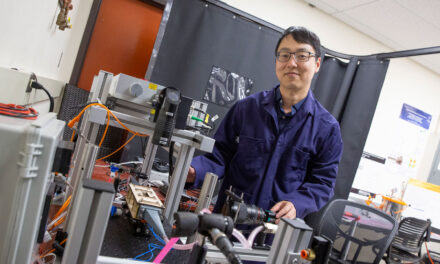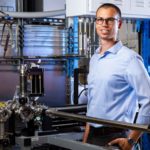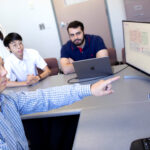
This Leap Day, leap into coding

Above: With as little as $50, anyone can learn to code. In addition to an impressive projected growth rate, software development is already a rapidly expanding industry. With a multitude of both free and paid resources to learn programming, there’s no better time to learn what’s becoming one of the most vital skills in the workforce of the future. Photo: Shutterstock.com
If you were to hear that you could start learning a skill with incredible economic opportunity and high social mobility for as little as $50, you might think it was a scam. But today, that’s all you need to take the leap into what is quickly becoming the defining discipline of the century: computer programming.
“Today you can buy a computer for under $50 and learn to develop code with completely free software,” says professor Tim Lindquist, Software Engineering Programs Chair in the Ira A. Fulton Schools of Engineering at Arizona State University.
In addition to the low financial barrier of entry, coding doesn’t consume resources or materials, making it incredibly easy to continue.
“Where else can you make a mistake and start all over again with it costing no more than your time and create incredibly useful tools with a minimum of raw materials?” asks Lindquist.
By 2024, the U.S. Bureau of Labor Statistics projects that software development jobs will grow an estimated 17 percent, web developing jobs will grow 27 percent and all computer-related job fields will increase by 12 percent. This growth of computing and coding occupations outstrips the mere seven percent increase for all other job fields. As the needs of the economy shift, efforts to prepare the workforce of the future pivot as well. Earlier this year, President Barack Obama unveiled his Computer Science for All Initiative, which looks to increase access to computer science for K-12 students across the nation. The initiative pledges $4 billion in funding for states to train educators in computer science education and develop high-quality instructional materials to overall expand access to this increasingly vital discipline.
In the private sector, both self-paced learn-to-code websites such as Codeacademy or Treehouse, as well as intensive, brick-and-mortar coding boot camps have seen explosive growth in the last five years alone.
“There are so many free online educational resources for computer science and software engineering,” said J. J. Robertson, computer science and electrical engineering senior and president of the Software Developers Association at ASU.
The growth of the industry comes as no surprise, as more and more aspects of everyday life are dependent on computers and the millions of lines of code telling them what to do.
“Around 2010, we interviewed a faculty candidate who had just returned from a software engineering conference where an engineer from a major auto manufacturer indicated that there were over 350,000,000 lines of source code in a fully optioned SUV that his company had just redesigned,” recalls Lindquist. “When I started working at ASU, there wasn’t a single line of code in an automobile.”
The rapid growth of programming in automotive engineering is one example of how widespread programming has become in a number of industries.
“It’s harder to find an area without computational support than those that do,” adds Lindquist.
As computer programming’s influence on other industries grows, a need for not only dedicated programmers, but also other occupations to know coding has increased as well.
“With the application of software development to other areas such as engineering, medicine, transportation, business and human services, students from other disciplines are increasingly better equipped for their career when they have software development background,” says Lindquist.
This shift toward a workforce where many, if not all employees have an understanding of basic computer programming aligns with the common belief that coding will become a form of basic literacy in the future.
“Many believe that computer science, more precisely computational thinking and software development will become similar to math or any other foundational discipline,” says Lindquist.
As programming marches steadily toward becoming an essential skill in the 21st century, take the leap into coding today. It may seem daunting at first, but Robertson advises beginning programmers to stick with it.
“It is common for people to get discouraged initially, but it is important to remember that no one’s first program does anything meaningful,” says Robertson. “The more software you write the better you get, I promise.”
By Pete Zrioka



































